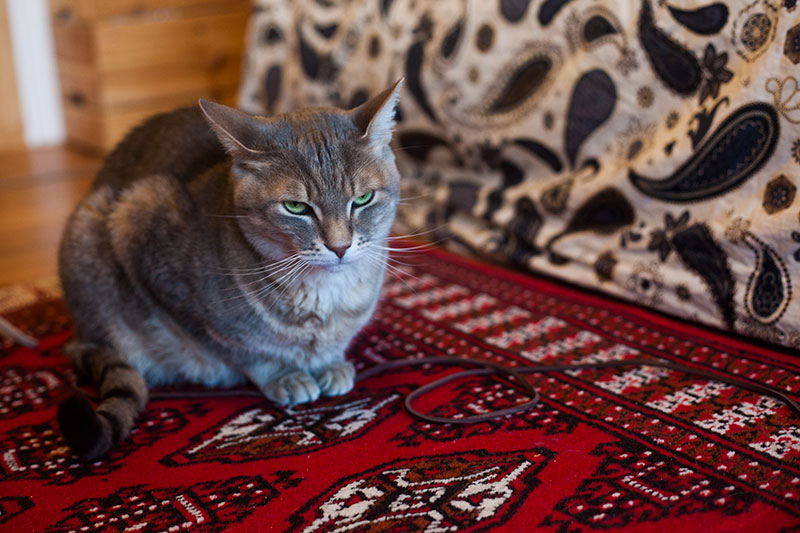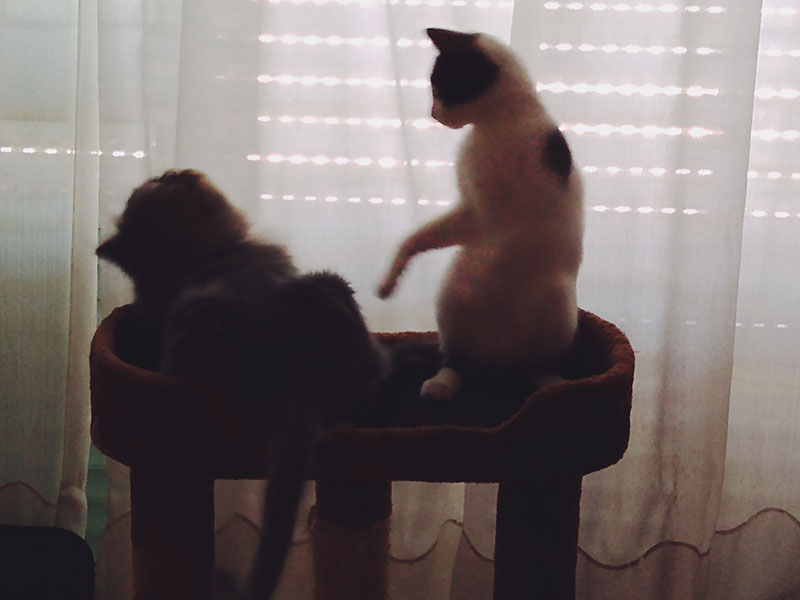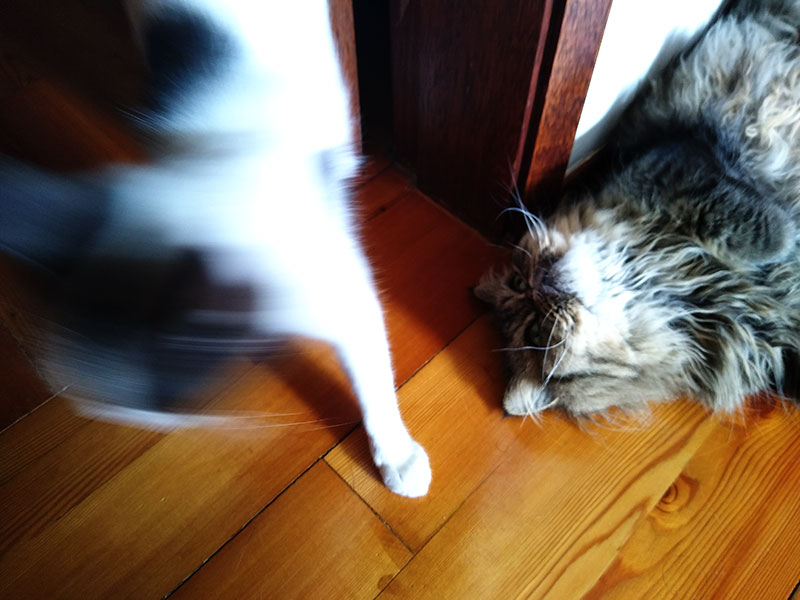If you’re wondering whether cats curse, you could be wondering about cursing in one (or two!) of two distinct ways, since the word itself has two different meanings:
1. A solemn utterance intended to invoke a supernatural power to inflict harm or punishment on someone or something.
2. An offensive word or phrase used to express anger or annoyance.

If you stumbled across this article wondering about one type of curse or another, let me know which version of cat cursing you were thinking of in the comments’ section down below.
If you found this page by looking up the question on Google, what happened to spark your curiosity?
Did you hear something about cat curses from a friend or family member, did you see a cat who seemed to curse right in front of you, did a section of a book, TV show, movie, YouTube video or other piece of media get you thinking about cats cursing? Would love to know!
Now, let’s take a look at each of the two types of curses, and whether our feline friends, feline enemies – heck, even feline frenemies – seem to be able to curse or have ever been thought of as able to curse historically.

Legends of Cat Curses: Historical Beliefs That Cats Invoked the Supernatural to Inflict Harm
If you’re wondering about feline ability to curse humans insofar as they’re able to wish upon us an ill fate, requesting of a supernatural power that harm comes upon us in the form of a wrathful punishment, you might feel there’s some sort of legend or myth about cats cursing humans that must be out there, and likely was even though to be true by many people historically.
Insofar as this is the case – you’re right! Actually, historically speaking, people seemed to believe that cats could do quite a lot of really terrible things to human beings. There isn’t just one myth about how ill fates can come to humans due to cats, there actually seem to be a plethora of myths about how felines could torment or even go so far as to kill human beings.
I’m not personally going to go into detail on any one of these, because I feel like this topic has been covered quite well by a number of other sources.
This Mental Floss article probably does the best job of rounding up legends about cats. It discusses how cats were thought to be able to “steal your baby’s breath,” “eat you for Christmas dinner,” “cause storms,” and “feast upon newborn babies.” Some even believed cats “work for the devil.”
Oh, and that terrible plague, the deadliest pandemic in human history that’s been recorded so far, sometimes called the Pestilence, the Great Mortality, or the Black Death or even just “the Plague”? Legend that cats actually “caused the Black Death” as well.
It’s a pretty long list of suspected offences, though not all civilizations and cultures thought of cats as evil, terrible things. This article on Wikipedia does a good job of explaining cultural depictions of cats by culture and time period, and don’t worry, many gods and deities exist that are cats, so they get that end of the spectrum, too, being worshipped by humans as well as scorned.
End all be all on this topic – it seemed people not only believe cats could curse humans, legend had it that they could actually kill and cause immense suffering to humans of their own accord.
I guess that sort of makes them the supernatural power, so they wouldn’t even have to pray or will one to harm humans, in these myths. They could just do it themselves.

Cat Cursing That’s Something Like Human Swearing: Is It Possible?
Then there’s the other kind of curse. The type of cursing that happens when you utter a not-so-nice word, typically just after an occurrence you feel is anything-but-good-for-you takes place.
It’s something akin to human swearing, and as the definition of this meaning of “curse” mentioned, you’ll often utter a curse when you feel angry or annoyed.
The Wide Negative Emotional Range of a Cat
Well, these are two emotions I feel a lot of cats are capable of, and most of the time, cats seem to be really good at expressing their capacity to feel these two emotions in ways humans will typically understand.
Ever met a person – whether that person loves cats or hates cats – who’s surprised to learn cats can be angry or annoyed? Doubt you’ll ever come across a soul.
Cats can be grumpy, irritable, and even downright mean. Sometimes a cat can act so crabby that their own pet owner thinks their cat hates them.
Pretty much everyone knows cats can display negative emotions, without even needing to know a cat firsthand. It’s part of the stereotype; part of common knowledge and how we see cats on a cultural level.
And I feel this stereotype, of cats being capable of a wide range of negative emotions, exists for plenty good reason.
Unlike dogs who seem to have a slew of positive emotions, then typically a far narrower array of negative emotions they’ll display (aggression, anger, and sadness, for instance), cats seem to go into negative emotional territory far deeper, and with far more emotional range (they seem to show contempt, disgust, annoyance, arrogance, rage, and so much more), and usually with far more frequently than dogs.
At least it seems this way to me, though be sure to leave a comment down below if you disagree – I’m very happy to be corrected!
I think this enormous negative emotional range is what makes cats feel to many of us incredibly akin to humans.
We get grumpy. We get irritated. We’re often annoyed. We, too, get mean when we’re exhausted, have been pushed to our limit patience-wise, or just so happen to be in a in a bad mood.

Why a Wide Range of Negative Emotions Might Lead Us to Believe Cats May Be Able to Curse
Humans feel a wide range of negative emotions, too, so when we see a cat display so many types of negative emotions, I think it makes them feel almost human to us.
Because they feel so alike to humans, it may even make us wonder if the other things they seem to do are actually similar to things we know we do – like curse when things don’t go our way.
Cats aren’t capable of using language in the way that we are. So they’re not able to swear, per say, uttering offensive things under their breath at a person or situation that’s happened that makes them angry or annoyed.
While they can’t use words, they can make sounds, and some of these sounds sound quite a lot like the vocalizations we make when we are angry.
The Vocalizations Cats Make That Sound Like Cat Cursing
Pet parents report hearing vocalizations from their cats – grumpy, annoyed, highly frustrated sounding groaning, trilling, or even growling – after something not-so-nice has happened to their cats.
This doesn’t always happen, and I’d say some cats do it way more often than others, but when it does happen, it seems like pet parents become pretty convinced the sound their cat is making is pretty much a feline version of cursing.
Again, this is not the sort of cursing humans do. Obviously, cats aren’t capable of using language or words the same way we are. So their curses don’t have that level of meaning.
But it seems like these vocalizations, which seem to be in direct response to upset, anger, resentment of a bad thing that has happened to them, is a grumble-y vocalization that seems quite similar to when we gnash our teeth and say things like “dammit!” or “drat!” under our breath because we’re so frustrated with how things are going for us.
I’ll show you a few examples I found of pet parents sharing stories of when and how their cats seem to curse, and you can let me know in the comments if you feel these experiences are akin to human swearing/cursing, or if you think they don’t qualify.
Please also take a moment to share any stories if you have them! I would love to know if you’ve ever seen what you feel is behaviour that’s anything like cursing from a cat.
Without further ado…

Firsthand Stories About Experiencing What Seems to Be Cats Cursing
Here’s a great example, written up on this Quora thread by Liam Crowleigh:
I’m pretty sure cats curse and that I’ve been cursed out by them lots of times.
For instance, as a kid we once had a cat that learned that the screen door rattled if he pushed on it. He used that as a way to tell us that he was at the door and wanted in.
If we came to the door relatively quickly, like within the first 3 or 4 times he rattled the door, he’d prance in, tail straight up and head held high and give a sort of “mroww-ow” almost as if to say ‘thank you’.
But if we were tardy in getting to the door (say the next commercial on TV wasn’t for 15 minutes) then the rattling of the door got louder and louder until it became a banging. It sounded like he must have been backing off and taking a run at it. Sometimes he did actually climb the door to look in through a skylight over top and then we had a heck of a time getting him down.
Anyway, in those times that we took too long to open the door, when he came in his head would be lowered and his tail would be horizontal instead of vertical. He didn’t prance with the same lift to his step and he vocalized a sort of “urrrrrrr” sound like he was swearing under his breath.
And the thing that really makes it seem like it was cursing was that the two sounds were not random. It was always the same sounds under the same circumstances.
And the “mroww-ow” sound also came when he was fed a meal of his favourite food, or a special treat, but not when he just got dry kibble or something ordinary.
And another one, in the same Quora thread, by Stacie Taylor Cornett:
I have one that most certainly does, but not in the way that you suggest. When a cat is yowling and trying to get away, such as when it knows you are taking the cat to a bath, it is expressing fear and alarm. Rather than cursing, a translation there would be more like, “NOOOO! Please, I hate this and there’s no reason for this! Let me go, I know what is happening and I don’t like it! I am certain I may surely die if you put me…No! No why aren’t you listening? I will say louder, STOP! NOOO”
Or something to that effect. In that case they are not cursing at you but begging you for mercy.
However, my Maine Coon gets very mouthy when he wants something and I do not agree to give it to him. If he wants outside and I tell him no, he will get persistently whiny about it. If I try to console him by petting or distracting, his whines turn into a grumbly half-growl because he knows he is not persuading me, and gets huffy about it. When he snuffle-snorts at me with a shake of his head and stalks off, I know perfectly well that he just called me a not-very-nice name.
So yes, I have been cursed at by a cat. He gets over it though and then we’re best friends again. I think he appreciates that I at least understand that he is cursing at me.
Want to see a video of what this type of behaviour might look like? Here’s one tagged with the title “cat swearing” – which certainly may fit the bill!
The cat could also be incredibly scared as well, however. Because we have no context, it doesn’t seem likely we’ll be able to know any better whether the situation surrounding this event meant the cat was likely doing something akin to swearing.
Some pet parents wouldn’t go so far as to call these behaviours curses, like Alice Erickson on this Quora thread:
I don’t know about curse, but I sure know about grumble and complain! Our Siamese used to make grumbly, complainy noises when she was displeased. She punctuated those noises with huffing sounds. She got her point across totally!

Your Thoughts on Cat Curses?
Did you originally stumble across this article thinking we were going do discuss cursing as it relates to invoking a supernatural entity to inflict harm, or on the swearing meaning of cursing?
Do you think cats can curse? And what type of cursing do you feel they’re capable of?
Do you have any stories or experiences to share with us – whether they’re your own or ones you’ve heard of?
Have you ever seen a video of a cat where he or she seemed to be cursing? Please take a moment to share it with us!
Would love to hear your thoughts on this topic in the comments down below.

I have 4 cats, 2 females that I got as kittens from a neighborhood stray cat. They are our princesses Elsa and Aroura aka Rory. I have male stray that my daughter picked up and a male kitten that she also scooped up when he was approx 5 weeks old. Rory is our curser She makes it very known when she is not happy with you. She feels that she deserves treats while you pour your coffee or after the dogs have been out to potty or any time you walk in the kitchen. If you don’t give her a treat she definitely curses at you.
Oops I forget to mention that Arlo is our male cats name and Marley is the baby
I swear hands down my cat tells me to fk off every time I want a cuddle, he’s given up now evidently & thinks I’m just a cray human person who feeds him on command, yip he meows for a bit , I answer him back and ask how his hunting went for the day, I praise him for being a good kitty guard cat n then I feed him. Some of the looks I get for cuddles though. Hmmmm
I often feel that my cat is cursing at me but she does a hiss instead of a grumble. Nearly always with a candy cane tail and no other signs of fear. My interpretation is that she thinks I’m too slow to feed her or leaving the house, etc. I do worry though that it’s something else instead but not having much luck figuring it out.
Ooh! That’s a good point about the tail stance.
I wouldn’t be surprised if it’s just over slow feeding! Cats sure do like being fed promptly.
Thanks and so true!
I don’t know about life-long evil curses – but if you have ever stepped on a paw or a tail they sure can swear at you !
Hahaha! Amazing comment, Mary!